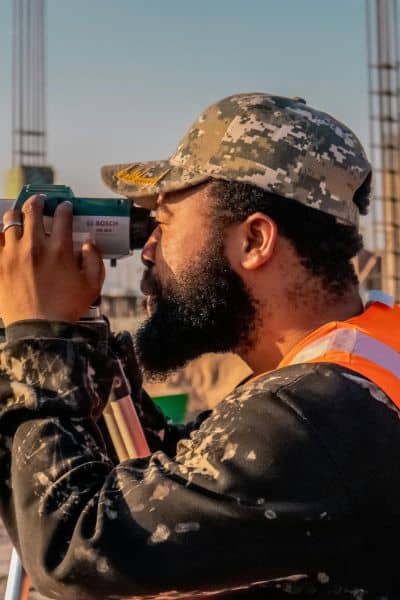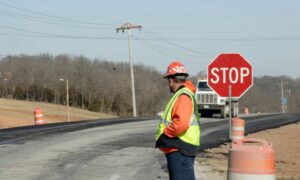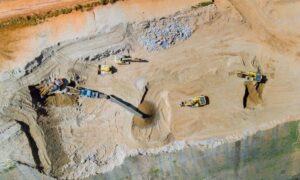Image by Ken Lund from Reno Nevada USA CC BY SA 20 via Wikimedia Commons
Big changes are coming, and they might hit closer to home than you think—literally. With the recent news that the U.S. Space Command could be relocated, many residents and developers are asking what this means for the city. One group watching closely? Land surveyors. Because when the future of a military base shifts, so does the need for one crucial service: the property survey.
You might not think military decisions affect your backyard or that vacant lot next door, but in cities like Colorado Springs—where defense is a major part of the local economy—it absolutely does.
What’s Going on with Space Command?
In case you missed it, there’s been a big debate over whether Space Command should stay in Colorado Springs or move to another state. This is a huge deal, not just politically but economically. Bases like these bring in jobs, housing demand, and government-backed construction. That means more buildings, more development, and—yep—more surveys.
The presence of a major military installation often drives nearby growth. When a command center like this stays put, the area around it usually sees increased property activity. And when that happens, everyone from developers to lenders needs to know exactly where property lines are. That’s where property surveys come in.
Why Does a Property Survey Matter?
A property survey tells you exactly where your land begins and ends. It marks legal boundaries so you know what you own—and what you don’t. Surveys are important when you’re:
- Buying or selling property
- Building something (like a house, garage, or fence)
- Getting a mortgage or refinancing
- Settling a dispute with a neighbor
- Preparing land for development
In other words, if anything big is happening to the land, a survey is usually step one.
If Space Command Stays: A Boom in Survey Demand

Let’s say Space Command stays in Colorado Springs. That’s likely to bring new government contracts, new defense companies, and a whole lot of construction. More housing will be needed for employees and military families. Businesses may look to set up shop nearby. City planners will need to consider roads, utilities, schools, and more.
All of this means land will change hands, be rezoned, or repurposed. Surveyors will be called in to make sure land boundaries are correct before anything is built. Expect to see an uptick in:
- Property surveys for residential developments
- Title surveys for commercial land deals
- Construction staking surveys to guide building layouts
- Mortgage surveys required by lenders before closing
In short, if the base stays, survey demand is going up.
If Space Command Leaves: A Shift, Not a Stop
Now, what if the base moves?
That could slow some projects—at least at first. Builders might pause plans. Property owners might hold off on selling or subdividing. But that doesn’t mean surveyors will be packing up their gear.
Instead, the focus may shift. Surveyors could be called on to help reclassify land, prep it for resale, or support zoning changes. Some property owners may need updated surveys to refinance, repurpose their land, or explore new uses.
For example, a parcel originally set aside for military housing could turn into a commercial space or even a new subdivision. Before any of that happens, the land will need a detailed property survey.
What This Means for Property Owners
Even if you’re not in the military or involved in government work, you could feel the effects of this change. If your home, rental property, or land is near Peterson Space Force Base or Schriever SFB, your property’s value could rise or fall depending on what happens.
That’s why it’s smart to get a fresh property survey—especially if you plan to sell, refinance, or develop in the next year. An accurate survey helps you avoid surprises like:
- Building too close to a boundary
- Selling land you don’t legally own
- Finding out a neighbor’s shed is on your lot
- Delays in permit approvals
In changing areas like this, up-to-date surveys offer peace of mind.
What Developers and Investors Should Watch
If you’re in real estate or construction, this relocation news should already be on your radar. Federal and military presence usually brings long-term economic stability. Whether the command stays or leaves, land use patterns around the area will change.
That means you’ll need surveys for:
- Subdividing land
- Rezoning applications
- Title insurance requirements
- Construction staking and layout
- Environmental and elevation reviews
Missed boundaries can delay your project or worse—land you thought was ready for development might not be.
Surveyors Are the Unsung Heroes of Change
During big transitions like this, surveyors do more than draw lines on a map. They help ensure smooth land transfers, reduce legal risk, and guide smart development. Their work informs real estate deals, mortgage approvals, and city planning decisions.
And let’s not forget, surveyors also use cutting-edge tools now—like drones, GPS mapping, and GIS systems—to capture more accurate land data, faster than ever. That technology will be key if Colorado Springs needs to quickly adapt to whatever decision is made about Space Command.
So, What Should You Do Now?
Keep an eye on the news. The final decision about Space Command’s location could come soon. In the meantime, consider your own land situation.
Are you thinking of selling?
Planning to build?
Buying land near a military area?
Waiting on rezoning approvals?
If so, now is a good time to schedule a property survey. Don’t wait until after things shift—by then, surveyors may be booked out for weeks, especially if demand spikes.
Final Thoughts:
Whether Space Command stays or goes, one thing is clear: changes to a major installation like this affect the entire region. And where there’s land in motion, there’s a need for property surveys.
If you own land in or around Colorado Springs, this could be a good time to explore your options. A quick conversation with a licensed surveyor can help you understand your property boundaries and stay prepared—no matter which direction the city takes next.





